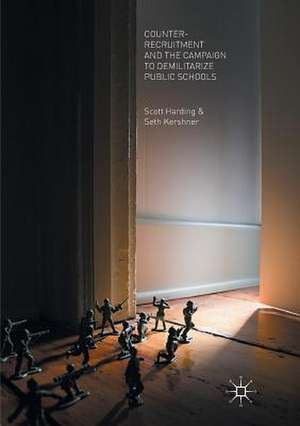Counter-Recruitment and the Campaign to Demilitarize Public Schools
Autor Scott Harding, Seth Kershneren Limba Engleză Paperback – 24 aug 2017
Preț: 381.21 lei
Nou
Puncte Express: 572
Preț estimativ în valută:
72.94€ • 79.48$ • 61.47£
72.94€ • 79.48$ • 61.47£
Carte tipărită la comandă
Livrare economică 23 aprilie-07 mai
Preluare comenzi: 021 569.72.76
Specificații
ISBN-13: 9781349952199
ISBN-10: 1349952192
Pagini: 191
Ilustrații: XIII, 191 p.
Dimensiuni: 140 x 216 mm
Greutate: 0.25 kg
Ediția:1st ed. 2015
Editura: Palgrave Macmillan US
Colecția Palgrave Macmillan
Locul publicării:New York, United States
ISBN-10: 1349952192
Pagini: 191
Ilustrații: XIII, 191 p.
Dimensiuni: 140 x 216 mm
Greutate: 0.25 kg
Ediția:1st ed. 2015
Editura: Palgrave Macmillan US
Colecția Palgrave Macmillan
Locul publicării:New York, United States
Recenzii
“Through stories and interview reports, Harding and Kershner deftly outline the varied procedures of military recruiters who focus on the public schools as their point of access to young people. … I am very pleased to see their research expanded significantly in this book, and … this book will receive wide attention across fields such as sociology, social work, education, political science and communications.” (Daniel Liechty, Journal of Sociology & Social Welfare, Vol. 43 (2), 2016)
Notă biografică
Scott Harding is Associate Professor and Associate Dean for Academic Affairs at the School of Social Work, University of Connecticut, USA. He has extensive advocacy and organizing experience on issues of homelessness, affordable housing, welfare, community development, and transnational labor solidarity. He was Executive Director and Policy Coordinator for the California Homeless & Housing Coalition, USA. He is a Board Member of Integrated Refugee and Immigrant Services (IRIS), and former Editor of The Journal of Community Practice.
Seth Kershner is an independent writer and researcher whose primary focus is the US military's growing presence in public schools. His work has appeared in a number of academic journals and books, as well as popular outlets such as In These Times, Rethinking Schools, and Sojourners, among others. Kershner currently works as a reference librarian at Northwestern Connecticut Community College, USA.
Textul de pe ultima copertă
This book describes the various tactics used in counter-recruitment, drawing from the words of activists and case studies of successful organizing and advocacy. The United States is one of the only developed countries to allow a military presence in public schools, including an active role for military recruiters. In order to enlist 250,000 new recruits every year, the US military must market itself to youth by integrating itself into schools through programs such as JROTC (Junior Reserve Officers' Training Corps), and spend billions of dollars annually on recruitment activities. This militarization of educational space has spawned a little-noticed grassroots resistance: the small, but sophisticated, “counter-recruitment” movement. Counter-recruiters visit schools to challenge recruiters' messages with information on non-military career options; activists work to make it harder for the military to operate in public schools; they conduct lobbying campaigns for policies that protect students' private information from military recruiters; and, counter-recruiters mentor youth to become involved in these activities. While attracting little attention, counter-recruitment has nonetheless been described as “the military recruiter's greatest obstacle” by a Marine Corps official.
Caracteristici
Challenges dominant cultural norms and social beliefs about the role of the military and its relation to (high school) students Provides one of the first analyses of counter-recruitment organizing and activism Features in-depth historical analysis and case studies of topics ranging from organizing strategies to consumer advocacy
